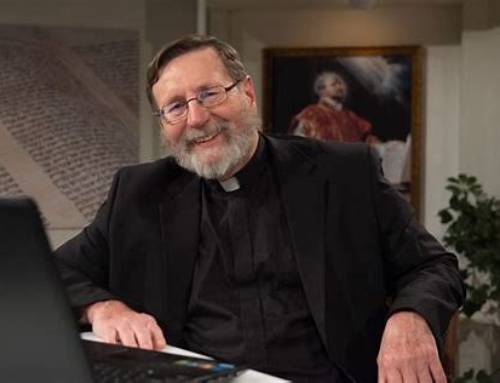There is a suggestion that at the Pan-Amazon Synod of Bishops coming up in October the South American bishops will request that yuca be substituted for wheat bread at the Eucharist. What is yuca? It’s another name for cassava a potato-like staple of Amazonian tribes. The argument is that, with long travel times and an extremely humid climate wheat bread gets damp and moldy. Also, yuca is to the tribal people what bread is to us. It is their staple food and would be more culturally appropriate.
Stop. You can’t do that. Monsignor Pope makes a heartfelt plea to the bishops not to even suggest using yuca for the eucharist. He explains a bit more about yuca points out that the law of the church forbids it
Yuca (not to be confused with yucca) is a South American starch tuber; it can also be found in Asia and Africa. Most of us northerners have little experience with it, but it is actually the main ingredient in tapioca pudding. Like other tubers, yuca can be used to make gluten-free “bread.” But it is not bread — it is merely bread-like. By definition, bread is made with grain. The Church has long been quite specific that the bread for the Holy Eucharist must be made with pure wheat flour. Nothing is to be admixed—no honey, no nuts, no other grains. This purity is necessary for validity.
Consider the following crystal-clear instruction from the Church document Redemptionis Sacramentum:
The bread used in the celebration of the Most Holy Eucharistic Sacrifice must be unleavened, purely of wheat, and recently made so that there is no danger of decomposition. It follows therefore that bread made from another substance, even if it is grain, or if it is mixed with another substance different from wheat to such an extent that it would not commonly be considered wheat bread, does not constitute valid matter for confecting the Sacrifice and the Eucharistic Sacrament. It is a grave abuse to introduce other substances, such as fruit or sugar or honey, into the bread for confecting the Eucharist. Hosts should obviously be made by those who are not only distinguished by their integrity, but also skilled in making them and furnished with suitable tools. (No. 48)
Does it really matter? Yes, matter matters, and this is the valid matter (or not) of the Eucharist.
Monsignor Pope goes on to suggest some practical solutions to the problems and calls for the change to be resisted, but he doesn’t go into the more important questions underlying the issue.
The underlying question is this: “Can Catholics change the valid matter of a sacrament for a good pastoral or cultural reason?” The bishops of the Amazon would seem to have good pastoral and cultural reasons for using yuca instead of wheat bread. The same situation might arise in all sorts of unusual cultural situations. Shall the Inuit people use whale blubber and crowberry juice for their Mass?
I once heard of an Episcopal priest at a youth retreat who wanted to be cool and relevant so he used Coca Cola and potato chips as the matter for the Eucharist. Hey! He would argue that he had good pastoral and cultural reasons for doing so.
This begins to get silly, but not unrealistic. Furthermore, when you extend the basic question to the other sacraments it becomes even more dangerous. Here’s why: If it is possible to switch out the matter for a sacrament for cultural and pastoral reasons, then the same principle could apply let’s say to Baptism. Why not “baptize” someone with sand or dust to remind them that they are but dust and to dust they will return? You think that’s silly? Witness the already existing stupid custom of people putting sand in the holy water stoops during Lent.
It is even more disturbing to apply the principle to the sacraments of marriage and ordination. Can you change the matter of the sacrament for cultural and pastoral reasons?
One of the reasons the church opposes same sex marriage is because marriage is a sacrament and the sacrament is only valid between one man and one woman who are free to marry. Two guys? Apart from the obvious moral issues, this can’t be marriage because two guys do not constitute valid matter for the sacrament.
The same principle applies to women’s ordination. One of the arguments against women’s ordination has always been, “The Church does not have the authority to change what Jesus established.” Jesus chose men. Therefore–even for good cultural and pastoral reasons–we can’t ordain women. However, if we can use yuca for the Eucharist for good pastoral and cultural reasons, then, by extension, there should be no problem in ordaining women for good pastoral and cultural reasons.
“Allowing local bishops to decide” is a nightmare situation for the church. Do you trust the local bishops to do the right thing? I don’t. If the bishops in the Amazon can decide to use yuca for Mass what’s to stop the Cardinals from Chicago, Newark and San Diego from allowing same sex marriage and ordaining women? They’d simply be changing the matter of the sacrament for “good cultural and pastoral reasons.”
Am I being alarmist? Not at all.
The “good pastoral and cultural reasons” are precisely the arguments used by activists in the Protestant churches for exactly these kinds of changes. When I was a priest in the Church of England the arguments for women priests were, “Times have changed. In our culture women are actively involved in all the professions. They can be doctors, Prime Minister, lawyers..why even the head of the Church of England, the Queen is a woman…In our culture women priests are appropriate.” The pastoral reason was, “Sally is such a good Christian and a faithful minister already. She is caring and kind and smart and well educated. It is so hurtful to her not to be able to be a priest when she feels called by God!”
This is the thing about Catholicism: Everything is connected. Begin picking at one little part for what seems a good reason and the whole thing starts to unravel.
The powers that be must think through the larger issues.
Change the matter of the sacrament–even for good pastoral and cultural reasons?
Nope. No can do.
Jesus himself established the sacraments. We can’t change what he established.






In the late 60s a friend of mine at Niagara University told of attending a Mass at Niagara University (Vincentian order) where Parkerhouse rolls were use for the Eucharist. My friend thought this was cool; I was appalled. But then I’ve always been a rules-obsessed curmudgeon – probably neo-Pelagianist to boot.